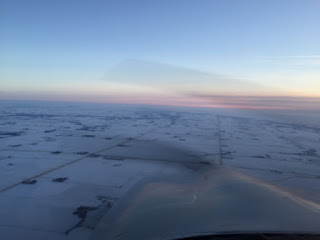Quick update today... got some decent work in over the weekend but really doesn't feel like much has changed. I guess a lot has been accomplished, but nothing can really be checked off yet, and it feels like everything is in a half-completed state (I'm finding this seems to happen periodically). Also, I'm really finding out what a specialized skill fiberglassing is. People who are good at it make it look so darn easy, and there are plenty of beautiful examples that can be found online of parts people made for their airplanes from fiberglass... I wouldn't say mine fall into that category yet. The good news, though, is I feel like I'm learning a lot, and eventually I'll be able to make the parts I need for this project.
I was able to re-make the ducting system for the overhead console, using a slightly modified design and an improved method of actually laying the glass. It came out much better this time, but it certainly still has its flaws. The good news is, of course, these parts aren't structural in any way, so as long as they don't fall off the ceiling in flight or something, I think we're ok from a safety standpoint.
Version 2.0 of the overhead ducting system
It's pretty similar in theory to the first one-- the duct on the left side brings air to the front two vents, and the duct on the right side brings air to the rear two vents. There will be a pair of servos in the tailcone controlling flow to each of these two ducts, and in this way we can control the amount of fresh air going to the front and back.
Now, the idea is to cover these ducts with the actual console itself. Since these ducts will be mostly hidden beneath the console, I'm not too terribly worried about how perfect they look, as long as they are airtight and have a good bond to the cabin cover. If all works out like what's in my mind, the final product will be a seamless-looking console that has four vents, four spotlights, some access panels, and some recessed accent lights to serve as dome and cargo lighting. Oh yeah, and the switch pod. Still at square one for that... also need to build a center console for the armrest and throttle quadrant. Sheesh! Lots more fiberglass to do.
In between epoxy curing sessions, I also started work on the panel. I had previously purchased a 24" x 48" sheet of 0.070" aluminum from Aircraft Spruce and intended to cut out my own (slightly larger) version of the instrument panel Van's gives you. I began by tracing out the original instrument panel and marking all the attach holes that go along the upper edge. Then, I drew a straight line across the bottom that is about a half inch below where the standard switch bar ends, thus making the panel about a half inch taller than stock, and all in one sheet. Lastly, I drew in lines for the center console and side vents and began cutting everything out. I used a combination of a jigsaw, dremel, belt sander, and an array of files:
New instrument panel after initial cut
Looks good! I sat down in the left seat and discovered there was still plenty of room for my knees too. The extra half inch of height really isn't noticeable at all from a comfort side of things, but it totally gives the appearance of having WAY more panel space...cool!
So now comes the fun part: laying out where all the instruments are going to go. I've agonized over this for months now... so many options, each with their advantage and disadvantage. It's time to make my mind up and just go for it. If I end up hating the layout, I guess I can always try again. Hopefully that won't happen.
The basic idea for the panel layout is to have the 10" G3X touch screens centered for each pilot/copilot, and the Mini-X backup EFIS in the center. The GTN750 and GMA350c audio panel will be mounted into the console (a bit low compared to many other configurations, more on this later), and the GMC307 flight control panel will be mounted high and center. This layout seemed to work the best so that the aircraft can be piloted just as easily form the left seat as the right seat-- one of our main requirements. So, I did some more measuring, tracing, and cutting, and ended up with this for a panel:
Instrument panel after cutouts for avionics
Good stuff! I found it wasn't nearly as hard to cut it out as I was thinking it might be. The hardest part was drawing all the lines to be perfectly straight and square. If you look super close there are a few cut lines that aren't perfect, but the mounting of all the instruments covers it all up nicely. So far so good... now it's on to switches!
I'm struggling a bit with the layout of the switches, but I think I have a general idea of where things are going to go. I'll post a diagram at some point when I finalize the layout, but right now I'm at the point of figuring out exactly what model I need for every single switch, indicator, and potentiometer. Kind of a fun task, but very tedious too. Also, turns out quality switches aren't the cheapest thing in the world. I'll be placing a pretty hefty order with Digikey in the coming days that should cover most of our immediate needs for switches and the like, then we will go from there.
That's it for now! Next up, more work on the overhead and panel...














